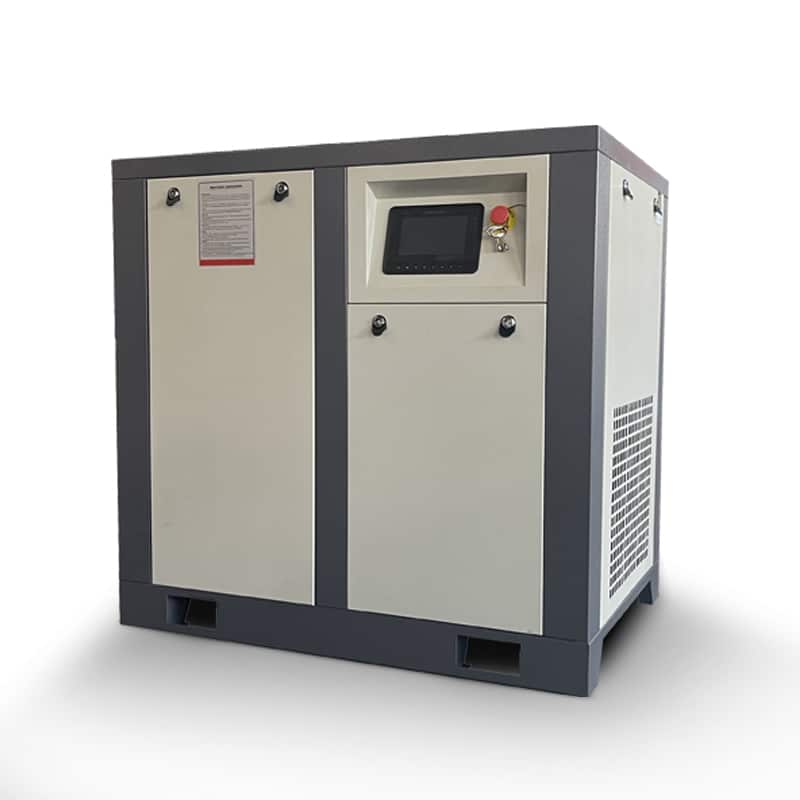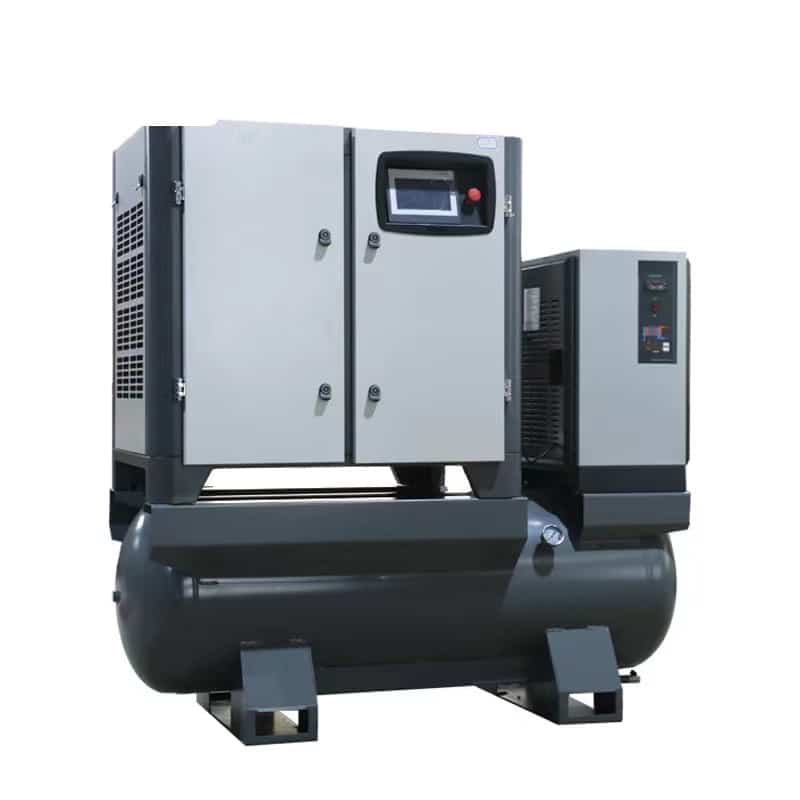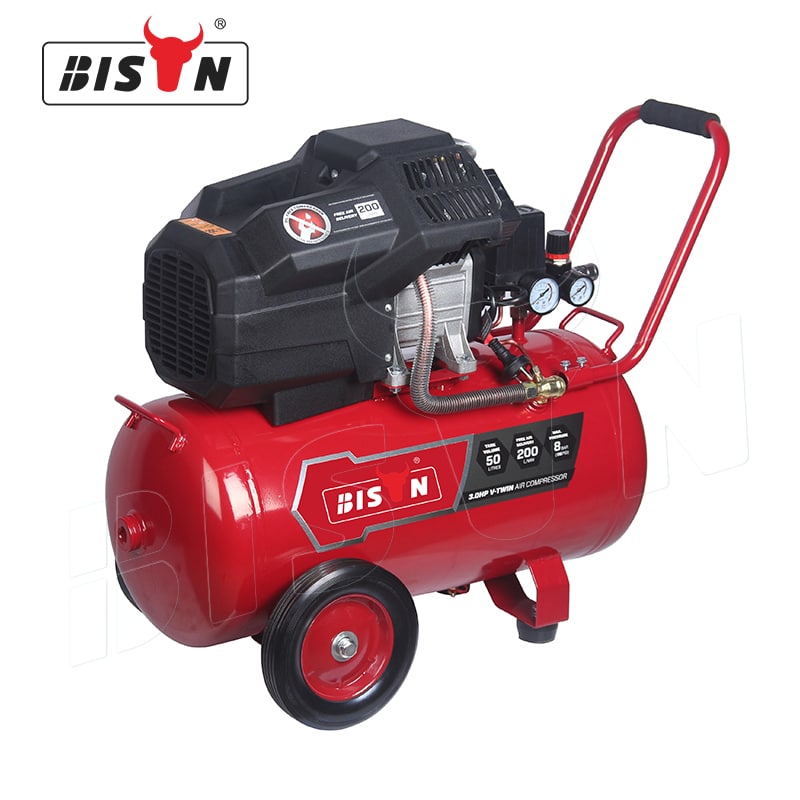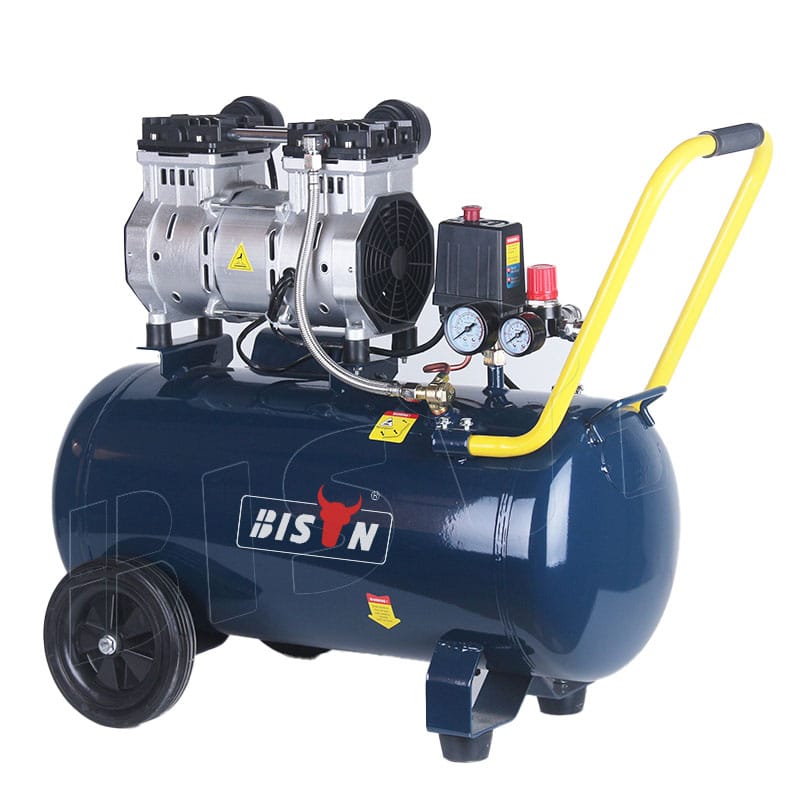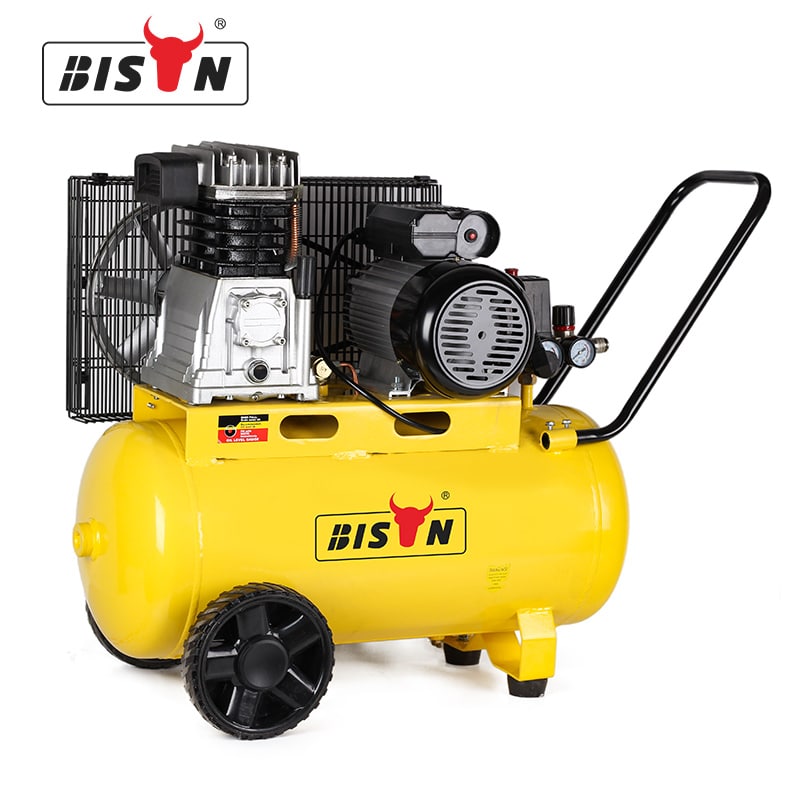air compressor blog
How to prevent your air compressor from overheating
- Jul 17, 2023
When an air compressor has performance issues, the problem can often be traced to a heating problem. In fact, air compressor overheating is one of the common causes of failure, even though the compressor may last for many years. So what are the causes of compressor overheating?
Air compressor overheating results from internal factors, external conditions, or sometimes both. At specific points in the system’s cycle, the air gets hot due to the processes involved but cools down quickly before reaching the end. However, if the air gets too hot for the compressor to handle, something is wrong with the machine.

For example, in a reciprocating air compressor, the air temperature will drop from 50 degrees Fahrenheit to 75 degrees Fahrenheit during the approximately six inches of travel between the discharge port and the discharge line. If the discharge port temperature exceeds 300 degrees Fahrenheit, the refrigerant oil and adjacent structures will be affected.
For the health of the air compressor, the discharge line temperature must not exceed 225 degrees Fahrenheit. Any warmer temperatures in the discharge line can cause the discharge to be dangerously hotter than 300 degrees Fahrenheit. If the discharge port temperature exceeds 350 degrees Fahrenheit, the heat may cause imminent failure of the system.
So how to prevent the air compressor from overheating? Read the following few sections for troubleshooting tips to prevent your air compressor from overheating.
Causes of air compressor overheating

When an air compressor overheats, the issue is usually related to something that is off the suction or discharge pressure. Alternatively, the problem could stem from insufficient ventilation, oil corrosion, or any issues related to machine parts’ wear and tear.
1) Low suction pressure
One of the primary problems that can cause an air compressor to overheat is high compression ratio, usually caused by low suction pressure.
Problems that can cause low suction include:
- Improperly installed components
- Metering device failure
- Obstructed strainers
- Refrigerant loss
- Pressure drop
For example, if a metering device fails, your ability to accurately monitor your system will be compromised. To maintain high suction pressure values, it is crucial to check for signs of these problems regularly.
2) Discharge pressure too high
Air compressor overheating problems are usually caused by excessive discharge pressure, which generally stems from one or more of the following issues:
- Dirty condensing coil
- Improperly installed discharge line
- Condenser air clogged
- Condenser fan inconsistent
- Too much refrigerant charge
- The condenser size is too small
To keep discharge pressure levels under control, you should periodically check the condensing components for any signs of problems. Even on large systems with built-in emissions monitoring, problems may go undetected until they spread to other air compressor parts.
3) Insufficient cooling space
If the air compressor is located in a warm area, it may be more difficult for the machine to condition the incoming air to the desired coldness. For example, suppose a machine is located in a poorly ventilated room. In that case, the heat in that room will affect internal processes and result in higher air temperatures and lower efficiency at the end of various pneumatic operations. Ambient heat can also cause internal moisture and condensation to build up, negatively affecting other essential compressor functions.
4) Insufficient space for standard compressor exhaust
Another issue closely related to the temperature around the air compressor is the amount of available ventilation. Is the machine ventilated adequately, or are the vents clogged or narrowed? If the machine is positioned so that the vents directly face the wall, the air compressor should be turned or moved to another area. By extension, if the room where the air compressor is located lacks adequate ventilation, the stuffiness and warmth of the air in the room can deprive the machine of the coolness it needs.
5) Old or clogged parts
As the components of an air compressor wear out with age, the entire machine is forced to work harder to perform its essential functions. For example, suppose an internal process becomes clogged in a critical area. In that case, the air compressor must exert more power to expel air from the compression chamber to the hoses that connect various air tools. To ensure that internal components operate efficiently without generating excessive heat, periodically evaluate internal performance.
6) Usage Frequency
Of course, the amount of wear and tear experienced by an air compressor can also easily affect its ability to continue operating at the desired temperature. If the compressor is old and used daily, then heating issues may be an unavoidable factor in the continued operation of the machine and its various peripheral components.
7) Ambient temperature
What is the temperature where you work? As temperatures rise in various regions, conditions that were ideal for air compressors two decades ago may now require some adjustments. If climate trends are making summers hotter in your area, step up the air conditioning of workspaces with compressed air systems.
8) Eroded oil
A problem closely related to passage blockage in compressed air systems is the problem of oil quality degradation. More specifically, when the oil ages and hardens, internal parts are forced to move without adequate lubrication. The surfaces of the metal parts grind against each other, and the parts are under stress as the machine is forced to work extra hard to reach its previous level.
Old, hardened oil is a significant culprit for heating your system. As parts wear, you will need to change the oil more frequently. If the air compressor smells like burnt oil, the oil has hardened, compromising the compressor’s ability to cool. Alternatively, the heat may cause the oil to lose viscosity and cause further problems.
9) Thermal valve
A faulty thermal valve can cause heating problems with the air compressor. It is a good idea to have a spare thermal valve on hand in case the existing valve on your machine needs to be replaced at any time. This way, you avoid potential downtime that would otherwise result in downtime if you had to wait days or weeks for a new valve if the thermal valve failed. Also, a new valve can be used for comparison to see if the existing valve is in sufficient operating condition. If not, you may have determined the source of your heating problem.
10) The type of air compressors
Certain types of air compressors are better suited for stricter tasks than others. If you run heavy air machinery 24/7 from a small air compressor, you may experience performance issues that could lead to overheating. Likewise, if the compressor is over 20 years old, it may need replacing. Consider the capacity and size of your compressed air system based on your current needs.
Signs of an air compressor overheating
If your air compressor is not working correctly, there is no doubt that a heating problem most likely causes the problem.
a) Compressor does not start
If the compressor does not start properly, there is a problem with the machine, most likely due to a heating problem. If the compressor takes longer between cycles of use, the internal components may take longer to cool down between cycles. Similarly, if the machine stalls during startup and takes longer to get into full run mode, this could be due to thermal degradation of the internal mechanisms.
b) Circuit breaker tripped
In an air compressor, the electrical current is regulated by a circuit breaker, which stops the electrical current when necessary as a safeguard for the performance and quality of the machine. If the circuit breaker operates erratically and trips seemingly randomly, it could indicate a more significant problem lurking inside the air compressor.
c) Oil-related issues
The air compressor may make noises or smells that indicate oil corrosion. If you can hear a faint, unusual squeaking noise from the machine, insufficient lubrication of internal parts may be the problem. An air compressor smelling of burnt oil is a more definite sign of oil failure. Either way, the situation should be checked immediately, as poor oil quality and insufficient lubrication can have a domino effect on the internal mechanisms of the air compressor.
d) Accelerated wear
More severe problems can arise when the air compressor wears out acceleratedly. For example, suppose a machine is experiencing performance issues weeks after it was last serviced. In that case, something may not have been adequately assessed, whether it was an issue with the oil, vents, refrigerant, or condenser components. If an air compressor is well past its usage time but can no longer meet basic needs, it can easily develop problems related to overheating.
Tips for preventing your air compressor from overheating
People often ask how to cool an overheated compressor. The better question, however, is how to prevent overheating from happening in the first place.
1) Focus on improving ventilation
The first step in reversing an air compressor heating problem should be to focus on the ventilation inside and around. Check each vent to make sure they are adequate for the machine. If not, you will need to replace the vent. Ask your maintenance staff about the proper ventilation size for your system size and current operation.
In addition, the external factors of the machine itself must be considered. If the machine is located in an area that is too hot or has insufficient ventilation, place the device in a more suitable area. Make sure this new location provides enough breathing room for each vent.
2) Regularly monitor compressor oil level and filter
As with any motorized machine or vehicle, ensuring the oil’s health in your air compressor is critical. Check the oil level regularly to provide enough oil for your operation. Also, check the viscosity to ensure the oil isn’t getting too thin – this could be a sign of overheating within the system. Also, check the filter every time you check the oil.
3) Monitor ventilation and ductwork
Even if you’ve modified the layout of your workspace to ventilate the air compressor and ambient temperature better, check ventilation and ductwork regularly. If the vents have accumulated dirt or dust, clean them accordingly. Ensure the ducting is flowing correctly and there are no crimps or punctures at any point in the system.
Even if, in all practice, you don’t find a reason to relocate the machine, the vents can still be problematic if they aren’t given the attention they deserve. An air compressor that isn’t venting properly can have heating problems no matter where the machine is placed.
4) Keep compressor parts up to date
As demand changes, the air compressor you bought for a year may not be able to meet demand in its initial state as the needs of your operation change. If your operation has required increased air power since you first purchased the machine, consider updating your air compressor with more optimized components.
Typically, the performance of an air compressor decreases steadily as operating demands gradually increase. This is due to increased demand, regardless of the existing capacity of the associated machines. As pressure increases at various points in your compressed air system, so will heating problems. To prevent this from happening to your compressor, have a service expert evaluate the machine and its peripherals and seek advice on the upgrades that will make the system adequate for your current workload.
What to do if you think your air compressor needs repair
Contact a repair professional when you realize your air compressor is overheating. The longer you wait, the wider the problem will spread throughout the system and the more severe the consequences.
a) Find a trusted service provider
To get the most out of your air compressor, you must have a trustworthy service provider. Licensed service experts can evaluate your machine and identify internal or external problems when they do arise.
If there is a problem with an internal component, the service guy will tell you the problem, whether it is low oil or one or more broken components. Additionally, the expert will examine the system layout to determine if changes to settings or connections are required. With regular inspections by an air compressor service expert, you can ensure the reliable performance of your system year after year.
b) Consider the benefits of replacing parts
If the needs of your current operation are more intense than when you purchased your air compressor, the machine, and its accessories are undoubtedly working harder now than ever. As wear increases, various parts of the system come under stress. Your air compressor can work more quickly and efficiently if you replace some old, worn parts with newer, more optimized ones.
For example, consider new valves, filters, hoses, and fans. With these new components, your compressed air system can easily suck in, compress and send cleaner air to a variety of end tools. When you speak with a service expert, ask which replacement parts will be best for your system.
c) Should or can you try to fix yourself?
Many details require your attention when running a large operation in a factory, workshop, or stamping shop. With so many things to oversee daily, it can be not easy to notice the finer details involving an air compressor and its various functions. As a result, the system may start to lag at the expense of productivity.
Since you own this machine, you might be tempted to do the maintenance yourself. However, air compressors are very complex machines that rely on many precise settings, without which operation would be inefficient. Even if you follow the instruction manual, your adjustments may be slightly off, resulting in high operating costs.
To prevent these problems, you should have your air compressor inspected by a licensed service professional and perform any necessary maintenance regularly. A licensed repairer will have years of experience inspecting and servicing all makes and models of air compressors. When you hire an air compressor service person to do what they do best, you can focus on your operation, knowing your machine is well maintained.
From the early days of compressed air technology to its rapid development in recent years, BISON has been at the forefront of innovation. Our air compressors enable factories to power various tools and machines, increasing productivity levels previously unheard of. Millions of goods are shipped daily to the shelves of domestic and foreign supermarkets. These products have been molded, dried, bottled, fastened, and labeled by BISON-powered machines and air tools.
frequently asked questions about How to prevent your air compressor from overheating
What happen if the compressor overheats?
If your air compressor is overheating, the first thing that can happen is the thermal overload button trips, which causes the circuit breaker to trip, stopping power to the air compressor, so the air compressor will shut off and won't turn on until it returns to normal. If your air compressor is constantly overheating, you may experience accelerated wear on the compressor and its components and potential oil-related problems.
How to prevent the compressor from overheating?
The best solution to an air compressor overheating problems is to prevent it from overheating. Some of the methods available include improving ventilation to ensure existing systems are operating adequately and considering the location of the compressor and whether it is placed in an environment that is too hot. Once you've improved your ventilation, you will have to monitor it regularly to ensure there's no dirt or dust buildup. In addition to venting, you should periodically check the oil level and filter of compressor and replace any parts if necessary.
What does it mean when the compressor is hot?
When your compressor is hot, it's a sign that it has to work harder than usual to meet your everyday demands. This can be due to many issues, including low suction pressure, high discharge pressure, insufficient or corroded oil, old or clogged components, defective thermal valves, insufficient ventilation, ambient temperature, type of air compressor time to cool down and take some steps to prevent the air compressor from overheating.
Why would an air compressor overheat and shut down?
Air compressor overheating is the N0.1 cause of unplanned shutdowns during operation. Temperature sensors within the air compressor monitor intake and discharge and oil temperature. In most industrial compressed air systems, the temperature sensor is connected to a thermal cutout switch that will cut power or stop the compressor from making air until it cools down. When the air compressor shuts off as the temperature rises, it's a sign that the system is working correctly. Turning off or unloading the compressor when it gets too hot will prevent further damage to the machine. If the system shuts down frequently, a problem needs to be addressed.
If you have any enquiries about the BISON air compressor, we would love to hear from you.


